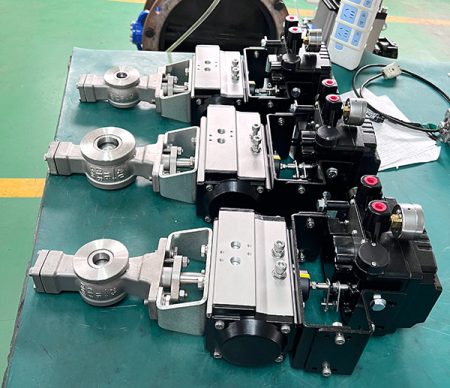
Industrial automation needs good control valves to keep things safe and working well. Pneumatic operated ball valves use air pressure to turn on and off quickly. They work in places with high pressure and tough jobs. These ball valves are important in pipelines, chemical plants, water cleaning, and air systems. Many businesses like oil and gas, power plants, and food factories use pneumatic valves. They choose them because they last long and work fast. The market for pneumatic ball valves is getting bigger. This is because people are spending more on water systems and energy. When people pick a pneumatic operated ball valve or compare it to an electric ball valve, they look at many things. They check the maker’s reputation, valve type, if the material fits, pressure rating, and how well it works.
Common industrial uses for pneumatic operated ball valves are:
- Oil and gas
- Water and wastewater treatment
- Chemical processing
- Power generation
- Food and beverage
- Semiconductor manufacturing
Key Takeaways
- Pneumatic operated ball valves use air to open and close fast. This makes them great for hard industrial work.
- Picking the right valve means you must think about material, pressure, size, and if it works with your system’s automation.
- Stainless steel and carbon steel valves do not rust and can handle strong chemicals. PVC valves are light and do not rust, so they are good for easier jobs.
- Jobs with high pressure or dangerous chemicals need strong valves like IMI PB Series and VELAN Securaseal. These valves help keep things safe and last a long time.
- Doing regular maintenance like cleaning, oiling, and checking seals keeps valves working well and helps them last longer.
- You should look for valves with certifications like ISO 9001, API 6D, and ATEX. These show the valves are safe, good quality, and follow the law.
- Good support from the maker, like warranties, guides, and quick help, lowers downtime and keeps valves working well.
- Using valves with automation systems gives better control, more safety, and lets people run them from far away in modern factories.
Top Pneumatic Operated Ball Valve Models
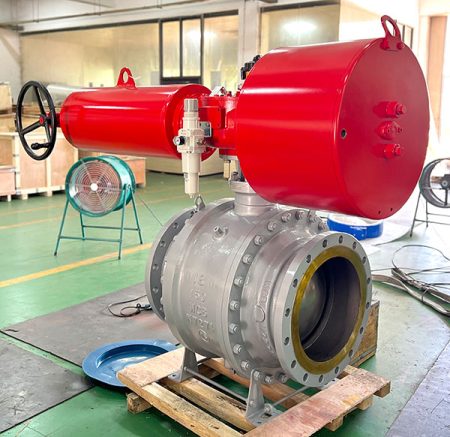
Emerson Keystone Series
Emerson is one of the best pneumatic valve brands. The Keystone Series gives strong ball valves for factories. These valves turn a quarter way to open or close. This helps control flow quickly and exactly. Emerson makes the valve body from stainless steel or carbon steel. These metals stop rust and work in hard places. The Keystone Series comes in many sizes. People use these valves in pipes, water plants, and chemical jobs. The actuator lets the valve work smoothly and saves air. Emerson’s ball valves pass tough industry tests. Many engineers pick the Keystone Series because it lasts long and is easy to fix. This valve is great for hard factory jobs.
Tip: Emerson’s Keystone Series is good for systems that need fast shut-off and strong sealing.
Flowserve Worcester Series
Flowserve’s Worcester Series is a top pneumatic valve line. This series has floating and trunnion-mounted ball valves. The Worcester Series also has full port designs. These let lots of fluid pass with little pressure loss. Flowserve uses special seat materials for tight shut-off. The Worcester Series works with many fluids, even harsh chemicals and gases. Flowserve gives many actuator choices for automation. These ball valves are used in oil, power, and food plants. The Worcester Series is easy to fix or upgrade because of its modular build. Flowserve is known for quality and new ideas, so many people choose the Worcester Series.
- Key Features:
- Many sizes
- Different seat and body materials
- High pressure use
- Easy to connect to control systems
KSB BOA-CV
KSB’s BOA-CV model works well in factories. This pneumatic operated ball valve is small and fits tight spots. KSB makes the valve body from strong stainless steel. This metal fights damage and chemicals. The BOA-CV can be used by hand or with air. People can change how they use it for different needs. KSB made the BOA-CV for water, steam, and chemical jobs. The valve controls flow well and reacts fast. KSB’s design means it needs little fixing and lasts a long time. The BOA-CV meets world safety and quality rules. Many factories trust KSB for strong and good ball valves.
Note: KSB’s BOA-CV model works best in automatic ball valve systems for water and chemical plants.
SAMSON Type 3321
SAMSON is a well-known company in the valve market. The Type 3321 pneumatic operated ball valve uses a strong actuator. This actuator helps the valve turn on and off quickly. The valve body is made from stainless steel or carbon steel. These metals do not rust and can handle strong chemicals. The Type 3321 turns only a quarter way to open or close. This makes it shut off fast and control flow well.
Engineers pick the Type 3321 because it works at high pressure. It also seals tightly to stop leaks. The valve is used in water plants, chemical jobs, and power stations. SAMSON adds special positioners and feedback systems. These help workers watch and change the valve easily. The valve has a modular design. This means fixing it is simple. People can change parts without taking the valve out of the pipe.
Note: SAMSON Type 3321 works great in automatic ball valve systems where safety and trust are very important.
IMI PB Series
IMI makes the PB Series for tough factory jobs. The PB Series has trunnion-mounted ball valves. This design holds the ball at both ends. It helps the valve last longer and not wear out fast. IMI uses strong metals for the valve body. These metals can take high pressure and strong chemicals.
The PB Series is used in oil, power, and water plants. IMI adds smart actuator technology for good control. The PB Series can be used with automatic systems and connects to controls easily. Workers like the PB Series because it is safe and lasts a long time. IMI also gives good help for all their actuated valves.
Tip: IMI PB Series is best for important jobs that need a pneumatic operated ball valve that is strong and works with automatic systems.
VELAN Securaseal
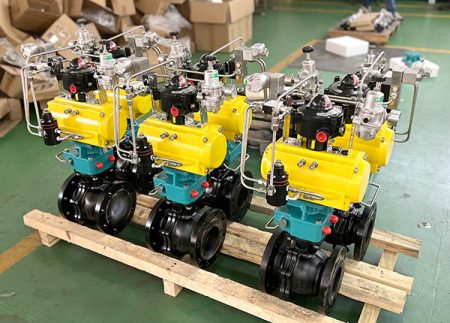
VELAN Securaseal is a great pick for hard jobs in factories. This pneumatic operated ball valve works well where things can rust or wear down. VELAN makes the valve body strong and thick. This helps it last longer and stay tough. The valve follows ASME B16.34 rules, which means it is high quality.
Key features of the VELAN Securaseal include:
- The valve body is thicker than most others. This helps stop rust and damage.
- The ball and seats fit together very well. They have special coatings for tough jobs. This helps the valve work in places with strong chemicals.
- Special coatings are put on the ball and seats. Sometimes the inside is coated too. This makes the valve last longer.
- The thrust bearing is outside the part that touches chemicals. This makes it easier to turn and helps it last.
- The valve is made for hard jobs like using acid or oxygen. It works well where there are strong chemicals.
- VELAN gives you choices for the body and inside parts. This helps stop rust even more.
- The stem packing keeps leaks very low. It meets top industry rules.
- You can change the seats without special tools. This makes fixing the valve easy.
VELAN Securaseal ball valves are used in chemical plants and mines. They are also used in other places that need safe shut-off and long life. The design helps workers handle strong fluids safely and easily.
Note: VELAN Securaseal is a good pick for jobs with strong chemicals or high pressure.
Valworx Air Actuated PVC Ball Valve
Valworx makes the Air Actuated PVC Ball Valve for people who need a light and rust-proof valve. The body is made from PVC, so it does not rust and can handle many chemicals. The air actuator turns the valve on and off fast. This is good for systems that work by themselves.
Valworx made this valve easy to put in and use. It is small, so it fits in tight spots. You can pick a double-acting or spring-return actuator. This lets you choose what works best for your job. The seats and seals are strong and work with many fluids.
This valve is used in water cleaning, fish tanks, and light chemical jobs. People like that it is easy to fix and shows if it is open or closed. The PVC body keeps it light. This helps when weight is important.
- Key Benefits:
- PVC body does not rust
- Air actuator works fast
- Simple to put in and fix
- Good for water, light chemicals, and food
Valworx air actuated ball valves work well in many jobs. They are good when metal valves might rust or be too heavy.
Apollo Valves 70-100 Series
Apollo Valves 70-100 Series works well for many factory jobs. These ball valves are strong and made from stainless steel or brass. The pneumatic actuator helps control flow quickly and exactly. This is important for systems that run by themselves.
Apollo’s 70-100 Series has full port designs. This lets lots of fluid move with little pressure loss. The valves come in different sizes and ends. This makes them easy to add to pipes you already have. The actuator goes right on the valve. This saves space and makes setup simple.
People pick Apollo 70-100 Series because it is easy to fix and works well. The valves can handle water, air, oil, and many chemicals. You can use them for just on-off or for changing flow. This gives more ways to use them in factories.
Tip: Apollo Valves 70-100 Series is a good choice for factories that need a strong, automatic ball valve for daily use.
KITZ Pneumatic Ball Valve
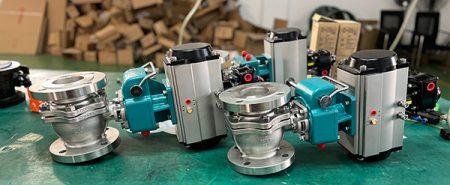
KITZ is a well-known company in the valve world. The KITZ pneumatic ball valve works well in many factories. KITZ makes these valves carefully with good materials like stainless steel and brass. These metals do not rust and can handle strong chemicals. The valve turns only a quarter way to open or close. This lets workers control flow fast and easily.
The KITZ pneumatic actuator valve uses air to work. This air actuator helps the valve move quickly and the same way each time. Many factories pick KITZ because the actuator and valve fit together well. The valve is small, so it fits where pipes are close together. KITZ gives both floating and trunnion-mounted types. This helps people pick the best valve for their job.
Maintenance workers like that KITZ valves are simple inside. The modular design lets them change parts fast. This means less waiting and keeps machines working. KITZ has different seat and seal choices. These help the air operated valve work with water, steam, oil, and chemicals.
Note: KITZ pneumatic operated ball valves follow world safety and quality rules. Many places like water plants, chemical factories, and food makers use KITZ auto valves because they work well.
KITZ valves are easy to use with automatic systems. Their valve and actuator sets connect to controls without trouble. This makes them good for places that want to use more machines. KITZ also gives help and guides for setting up and fixing their valves.
Features Overview
Picking the best pneumatic operated ball valve means looking at many features. Each company makes their actuated valves for special jobs. Some valves can handle high pressure or stop rust. Others are made to shut off flow safely. Many valves use strong metals like stainless steel or special mixes. This helps them work in tough places like chemical plants and oil refineries. Some models, like IMI PB Series and VELAN Securaseal, have extra safety for high pressure and dangerous chemicals. Most pneumatic ball valves can show if they are open or closed. Some have emergency shut-off systems. These things help workers keep control and stay safe in hard jobs.
Companies test their pneumatic actuator valves by strict rules. They check for leaks and make sure the valves can take high pressure. Many brands, like Emerson, Flowserve, and KITZ, have important safety certificates. These include ISO 9001, API 6D, and ATEX. These certificates mean the valves are safe and good quality. Many actuated ball valves are made in parts. This makes fixing them easy and saves time. Some air actuated ball valves, like Valworx, use light PVC for jobs where rust is a problem. Others, like Apollo 70-100 Series, are made to work well with automatic machines.
Specifications Summary
Here is a table that shows the main features and best uses for each top pneumatic operated ball valve:
| Manufacturer | Model | Valve Type | Material | Size Range | Pressure Rating | Certifications | Best-Use Scenario |
|---|---|---|---|---|---|---|---|
| Emerson | Keystone Series | Quarter-turn, Full port | Stainless steel, Carbon steel | ?”–24″ | Up to 1500 psi | ISO 9001, API 6D | High pressure pipelines, chemical plants |
| Flowserve | Worcester Series | Floating, Trunnion, Full port | Stainless steel, Alloy | ?”–12″ | Up to 1000 psi | API 607, ISO 9001 | High pressure, corrosive fluids |
| KSB | BOA-CV | Quarter-turn | Stainless steel | ?”–8″ | Up to 600 psi | ISO 9001 | Water, steam, chemical processing |
| SAMSON | Type 3321 | Quarter-turn | Stainless steel, Carbon steel | ?”–12″ | Up to 1000 psi | ATEX, ISO 9001 | High pressure, automated control |
| Tanggong | TGQ Series | Floating | Stainless steel, PVC | ?”–6″ | Up to 600 psi | ISO 9001 | Water, air, light chemicals |
| IMI | PB Series | Trunnion-mounted | Stainless steel, Alloy | 2″–24″ | Up to 2500 psi | API 6D, ISO 9001 | High pressure, oil and gas |
| VELAN | Securaseal | Trunnion-mounted | Stainless steel, Alloy, Coated | 2″–16″ | Up to 2000 psi | API 6D, ISO 9001 | High pressure, hazardous chemicals |
| Valworx | Air Actuated PVC Ball Valve | Quarter-turn | PVC | ?”–4″ | Up to 150 psi | FDA, ISO 9001 | Water, food, light chemicals |
| Apollo | 70-100 Series | Quarter-turn, Full port | Stainless steel, Brass | ?”–6″ | Up to 600 psi | ISO 9001 | General factory, automated systems |
| KITZ | Pneumatic Ball Valve | Floating, Trunnion | Stainless steel, Brass | ?”–8″ | Up to 1000 psi | API 6D, ISO 9001 | Water, steam, oil, chemicals |
Operators should pick a pneumatic actuated ball valve that fits the system’s pressure and material needs. For high pressure or dangerous chemicals, IMI PB Series and VELAN Securaseal are safer and stronger. These actuated valves shut off well and control flow even after not being used for a while. The right ball valve and actuator help keep the system safe, work well, and last a long time in any factory.
Valve Profiles
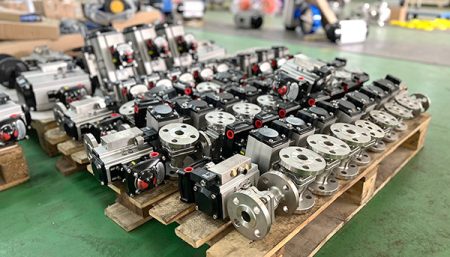
Emerson Keystone Series
Features
The Emerson Keystone Series is a trusted pneumatic operated ball valve. Emerson makes the valve body from stainless steel or carbon steel. These metals do not rust and can handle tough places. The valve turns only a quarter way to open or close. This lets workers control flow fast and exactly. The actuator valve works well with automatic machines. Emerson gives many sizes, so it fits lots of factory jobs. The modular build makes fixing and repairs simple.
Performance
Emerson’s pneumatic actuator valve works well under high pressure. The air actuator valve reacts fast to control signals. There is very little leaking because the seal is tight. The valve and actuator work together for good on-off control. The Keystone Series stays reliable even after not being used for a while. Emerson checks each actuated valve to meet strict rules.
Applications
Engineers use the Keystone Series in pipelines, chemical plants, and water cleaning. The pneumatic actuated ball valve is good for systems that need quick shut-off. Many factories use this air operated valve for safety and control. The Keystone Series fits easily into automatic ball valve systems.
Tip: The Emerson Keystone Series is best for high-pressure pipes and chemical plants that need fast, safe shut-off.
Flowserve Worcester Series
Features
Flowserve’s Worcester Series has many types of pneumatic ball valves. The series has floating and trunnion-mounted designs. Full port choices let lots of fluid move with little pressure loss. Flowserve uses special seat materials for tight shut-off. The actuator valve connects easily to control systems. The modular design makes upgrades and repairs quick.
Performance
The Worcester Series seals well, even with harsh fluids. The pneumatic operated ball valve can take high pressure and still work well. The air actuated valve runs smoothly in automatic systems. Flowserve’s actuated valves keep working in tough jobs. The actuator and valve help control flow exactly.
Applications
Workers use the Worcester Series in oil plants, power stations, and food factories. The pneumatic actuator valve is good for systems with strong chemicals or gases. The Worcester Series fits both new and old automatic ball valve setups.
Note: Flowserve Worcester Series is great where you need to stop rust and have high flow.
KSB BOA-CV
Features
KSB’s BOA-CV is a small pneumatic actuated ball valve. The stainless steel body fights damage from chemicals and wear. The valve can be used by hand or with air. KSB made the BOA-CV easy to put in tight spaces. The actuated valve meets world safety and quality rules.
Performance
The BOA-CV reacts fast in automatic systems. The air operated valve keeps flow steady, even when pressure changes. Workers do not need to fix it much because it is strong. The actuator valve shuts off well and does not leak much.
Applications
Factories use the BOA-CV in water cleaning, steam pipes, and chemical jobs. The pneumatic ball valve is good for automatic ball valve systems that need to change. KSB’s BOA-CV can fit many different factory needs.
Note: KSB BOA-CV is best for small spaces in water and chemical plants that need strong, automatic flow control.
SAMSON Type 3321
Features
SAMSON Type 3321 is a trusted pneumatic operated ball valve. The valve body is made from stainless steel or carbon steel. These metals help stop rust and damage from strong chemicals. SAMSON gives this model a strong air actuator valve. This makes the valve move fast and exactly. The valve turns only a quarter way to open or close. This lets workers control flow quickly. The modular build makes fixing and repairs easy. Workers can change parts without taking the valve out of the pipe. The Type 3321 works with special positioners and feedback systems. These help workers watch and change the valve from far away.
- Stainless steel or carbon steel body
- Modular design for easy fixing
- Advanced actuator valve with positioners
- Tight seal to stop leaks
Performance
The SAMSON Type 3321 pneumatic actuator valve works well under high pressure. The air actuated valve reacts fast to control signals. The tight seal keeps leaks from happening, even with strong fluids. The actuated ball valve stays reliable in automatic ball valve systems. SAMSON checks each valve to meet tough industry rules. The actuator and valve work together for steady performance over time.
Note: SAMSON Type 3321 gives safe shut-off and flow control in hard jobs.
Applications
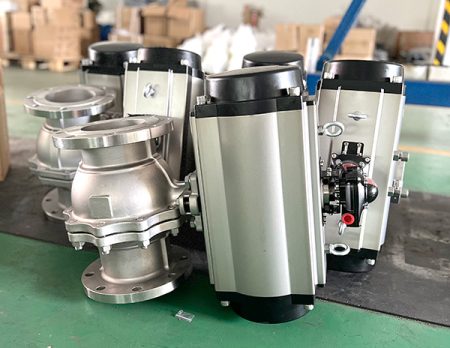
SAMSON Type 3321 in water plants, chemical jobs, and power stations. The pneumatic actuated ball valve is good for systems that need quick and safe shut-off. Many places pick this air operated valve for automatic control and safety jobs. The modular design makes it easy to add to pipes already in use.
Tanggong TGQ Series
Features
Tanggong TGQ Series is a good choice for many factory needs. The floating ball design keeps the seal tight, even when pressure is high. Tanggong sells the pneumatic ball valve in stainless steel or PVC. This gives choices for different places. The air actuator valve works smoothly and does not need much air. The simple design helps stop leaks and makes cleaning easy.
- Floating ball design for tight shut-off
- Many material choices: stainless steel or PVC
- Small and light build
- Easy to put in and fix
Performance
The TGQ Series pneumatic operated ball valve works well in water, air, and light chemical systems. The air actuated valve opens and closes fast, which helps automatic ball valve systems. The actuated valve keeps a strong seal for a long time. Tanggong checks each actuated ball valve to make sure it lasts and does not leak.
Tip: Tanggong TGQ Series is great for systems that turn on and off a lot and need little fixing.
Applications
Factories use the TGQ Series in water pipes, chemical dosing, and air lines. The pneumatic actuator valve fits in small spaces and light pipes. Many workers pick this air operated valve because it needs little fixing and lasts long. The TGQ Series is easy to use in new or old projects.
IMI PB Series
Features
IMI PB Series is made for tough factory jobs. The trunnion-mounted design holds the ball at both ends. This helps the valve last longer and not wear out fast. IMI uses strong stainless steel or alloy for the valve body. The pneumatic actuator valve has smart technology for good control. The modular build lets workers change parts fast and upgrade easily.
- Trunnion-mounted ball for long life
- Strong stainless steel or alloy body
- Smart actuator valve technology
- Modular build for quick fixing
Performance
The IMI PB Series pneumatic actuated ball valve can take high pressure and strong chemicals. The air actuated valve reacts well to control signals. The actuated valve keeps a tight seal, even after not being used for a while. IMI’s actuated valves meet world safety and quality rules. This makes them work well in important jobs.
Note: IMI PB Series is best for high-pressure jobs where safety and trust are needed.
Applications
Engineers put the IMI PB Series in oil and gas pipes, power plants, and water plants. The pneumatic operated ball valve works well with automatic control systems. Workers like the actuated ball valve because it is strong, safe, and easy to fix. The PB Series is good for both new jobs and upgrades in old plants.
VELAN Securaseal
Features
VELAN Securaseal is made for tough factory jobs. The body is thick and made from stainless steel or alloy. This helps stop rust and damage from strong chemicals. The trunnion-mounted ball lets the valve handle high pressure. Special coatings are put on the ball and seats. These coatings help the valve last longer in harsh places. The stem packing keeps leaks very low. Workers can change the seats without special tools. The modular design makes fixing and upgrades fast.
- Thick, rust-resistant body
- Trunnion-mounted ball for high pressure
- Special coatings for chemical safety
- Low-leak stem packing
- Easy seat changes
Performance
VELAN Securaseal shuts off flow well in hard jobs. The pneumatic actuator valve reacts fast to control signals. The air actuated valve keeps a tight seal, even with dangerous fluids. The actuated ball valve meets strict rules like API 6D and ISO 9001. People trust this air operated valve because it lasts long and needs little fixing. The ball valve and actuator work together for steady use under pressure.
Note: VELAN Securaseal is best where safety and strength are most important.
Applications
Engineers pick VELAN Securaseal for chemical plants, mines, and refineries. The pneumatic actuated ball valve can handle acids, oxygen, and other risky fluids. Many places use this actuated valve when safe shut-off is needed. The design works for new setups and upgrades in old plants.
Valworx Air Actuated PVC Ball Valve
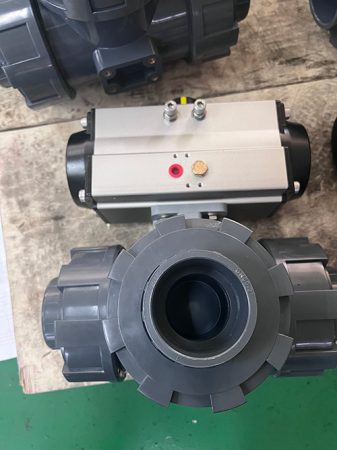
Features
Valworx makes a light air actuated ball valve with a PVC body. This pneumatic operated ball valve does not rust and works with many chemicals. The actuator valve comes as double-acting or spring-return. The seats and seals are strong and last a long time. The small size fits tight spaces. The indicator shows if the valve is open or closed.
- PVC body stops rust
- Fast air actuator valve
- Double-acting or spring-return choices
- Easy-to-see position indicator
- Simple to put in and fix
Performance
Valworx air actuated valve works fast and well. The pneumatic actuator valve opens and closes using little air. The actuated ball valve keeps a strong seal, even after many uses. The light build makes it easy to move and install. The valve meets FDA and ISO 9001 safety and quality rules.
Tip: Valworx air actuated PVC ball valves are best for water cleaning, fish tanks, and light chemical jobs.
Applications
People use Valworx pneumatic ball valves in water systems, food plants, and labs. The air operated valve is good where metal valves might rust or be too heavy. The automatic ball valve connects easily to control systems for hands-free use.
Apollo Valves 70-100 Series
Features
Apollo Valves 70-100 Series is a strong pneumatic operated ball valve for many jobs. The body is made from stainless steel or brass. The full port design lets lots of fluid move with little pressure loss. The actuator valve goes right on for a small setup. Apollo gives different end connections for easy use. The modular design makes repairs quick.
- Stainless steel or brass body
- Full port for high flow
- Direct-mount actuator valve
- Many end connection choices
- Modular build
Performance
Apollo’s pneumatic actuated ball valve controls flow fast and right. The air actuator valve reacts quickly to control signals. The actuated valve keeps a tight seal and does not leak. Workers find the ball valve and actuator easy to fix. The 70-100 Series meets ISO 9001 quality rules.
Note: Apollo Valves 70-100 Series is good for factories that need strong, automatic ball valves.
Applications
Engineers use Apollo pneumatic ball valves in water, air, oil, and chemical systems. The air operated valve fits new projects and upgrades. Many factories use this actuated ball valve for daily on-off or flow control. The automatic ball valve works well with plant control systems.
KITZ Pneumatic Ball Valve
Features
KITZ is a well-known company in the valve business. The KITZ pneumatic ball valve is strong, accurate, and flexible. KITZ makes the valve body from stainless steel and brass. These metals do not rust or get damaged by chemicals. The valve can have a floating or trunnion-mounted ball. This lets engineers pick what works best for their system.
The actuator valve uses air to open and close the ball valve fast. KITZ gives double-acting and spring-return actuator valve choices. The modular design makes fixing the valve easy. Workers can change seats, seals, or the actuator without taking the valve out of the pipe. The small size helps it fit in tight spaces.
Key features are:
- Many material choices: stainless steel, brass, and special alloys
- Floating or trunnion-mounted ball designs
- Modular actuator valve for easy upgrades
- ISO 5211 mounting pad for direct actuator setup
- Different seat and seal materials for water, steam, oil, and chemicals
- Visual position indicator shows if the valve is open or closed
Note: KITZ pneumatic operated ball valves follow world rules like API 6D and ISO 9001. This means they are safe and good quality.
Performance
KITZ pneumatic actuated ball valves work well in tough places. The air actuator valve reacts quickly to control signals. This gives exact on-off or flow control. The tight seal stops leaks, even with high pressure or strong fluids.
The actuated valve keeps working the same way for many uses. KITZ checks each actuated ball valve for pressure, leaks, and strength. The actuator and valve move smoothly and do not wear out fast. The design helps stop long breaks and makes the valve last longer.
A KITZ air actuated valve can take many temperatures and pressures. The strong build lets it work in normal or hard jobs. The actuator valve connects easily to automatic control systems. This lets people run it from far away and use it in plant automation.
Applications
Engineers use KITZ pneumatic operated ball valves in many factory systems. These actuated valves are found in water plants, chemical factories, food plants, and oil and gas jobs. The air operated valve works for new setups and upgrades to old pipes.
Common uses are:
- Automatic ball valve systems for water, steam, and oil control
- Chemical mixing and dosing lines
- Process automation in food and drink plants
- Air actuated valve use in HVAC and utility systems
- Safety shut-off for dangerous fluids
Tip: KITZ auto valves are a good pick for jobs that need fast action, long life, and easy use with plant machines.
The KITZ pneumatic actuator valve is known for being useful, strong, and simple to fix. This makes it a top choice for engineers who want safe and easy flow control in today’s factories.
Pneumatic Actuator Valve Selection
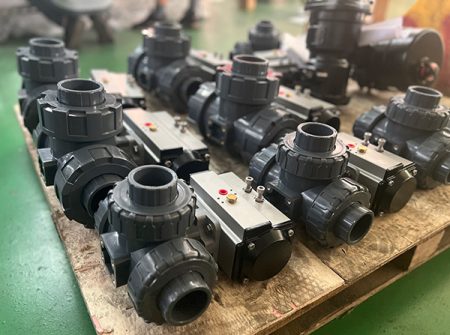
Durability
Durability is very important when picking a pneumatic actuator valve. Workers need valves that last in tough places and with lots of use. Many things can change how long a valve will work. The table below shows the main things that help a valve last longer:
| Durability Factor | Explanation |
|---|---|
| Protection against dust and debris | Good seals keep out dirt and dust. This stops damage inside the valve. |
| Material and seal selection | Strong materials fight off rust, chemicals, and heat. This keeps the actuator safe. |
| Temperature resistance | The actuator must handle hot and cold. This stops seals from breaking and oil from going bad. |
| Chemical and corrosive exposure | Use rust-proof metals like stainless steel or aluminum. These metals do not get ruined by harsh stuff. |
| Maintenance and cleaning | Clean and check the valve often. This stops dirt from building up and helps find problems early. |
Workers should also keep the air clean and dry. Filters help stop damage to the actuator. The right air pressure and amount make the actuator work well. Picking the right size and torque stops the valve from wearing out too soon. Choose valves that are easy to fix and have spare parts. Good help from the maker keeps the valves working well.
Material Compatibility
Material compatibility is key for how long a pneumatic actuator valve lasts. The stuff moving through the valve decides what materials are best. Metals like stainless steel, brass, and bronze do not rust and can take heat. These metals help valves last longer in hard jobs. Plastics like PVC cost less but do not work well with heat or high pressure. They also do not last long with strong chemicals.
The seal material must also fit the job. PTFE seals work with many chemicals and can take heat. Elastomers like Viton or EPDM need to be checked for chemical safety. A chemical chart helps pick the right seal. Buying valves from good makers means better materials and longer life. Picking the right materials for the valve and seals is very important for strong, safe valves.
Size and Pressure
Picking the right size and pressure for a pneumatic actuator valve keeps things safe and working well. These valves come in many sizes, called Nominal Pipe Size (NPS). Sizes go from 1/4 inch up to 24 inches or more. Pressure ratings use rules like ANSI Class 150, 300, and 600. For example, Class 150 can take about 285 psi at 100°F. Class 600 can take up to 1,480 psi. Some places use PN 16, which is about 232 psi.
Workers must pick a valve with a pressure rating higher than the system’s top pressure. This keeps things safe and stops the valve from breaking. Pneumatic actuators usually use air between 60 and 100 psi. Control signals are often from 3 to 15 psi. This helps move the actuator the right way. The valve type—like quarter-turn, floating, trunnion-mounted, or full port—must fit the job’s flow and pressure needs.
Tip: Always check the size and pressure rating before putting in a pneumatic actuator valve. This helps stop leaks and keeps the valve working well, even with high pressure.
Automation Integration
Automation is very important in today’s factories. Engineers connect pneumatic operated ball valves to control systems for better safety. These valves work with many automation devices. Some common devices are solenoid-operated pilot valves, limit switches, and pneumatic positioners. Electro-pneumatic transducers are also used. These devices change electric signals into air pressure. They also tell workers where the valve is.
Factories use control signals like 4-20 mA to move the valve. Pneumatic ball valves connect to PLCs, SCADA, and DCS systems. Workers can control the valves from panels or far away using SCADA or DCS. In places with dangerous gas or dust, engineers use special covers and safe parts. These protect the actuating valve from harm.
Tip: Make sure your pneumatic actuator valve works with your plant’s automation system. This helps everything run smoothly and makes upgrades easier later.
Maintenance
Good maintenance keeps pneumatic operated ball valves working longer. Checking the valve often helps find leaks or damage early. Cleaning the valve removes dirt that can cause rust or leaks. Lubricating moving parts helps stop friction and wear. Workers should change old valve seats, o-rings, seals, and gaskets when needed.
Pressure tests help find leaks inside the valve. They also check if the actuator works right. Protect the actuator from dust, water, and strong chemicals. Covers or coatings can help keep it safe. Always follow the maker’s maintenance plan and industry rules. Make a regular schedule based on how much the valve is used. Safety steps like lockout-tagout keep workers safe during repairs. For hard problems, ask experts for help.
- Check for leaks and worn parts often
- Clean and oil moving parts
- Change damaged seals and seats
- Test for leaks with pressure
- Protect from tough environments
- Follow the maker’s instructions
Note: Good care helps the pneumatic ball valve last longer and keeps the system safe.
Certifications
Certifications show that pneumatic operated ball valves are safe and high quality. In jobs like food, medicine, and water, these certifications are very important. They prove the valve is safe, works well, and is trusted everywhere.
| Certification / Standard | Why It Matters for Pneumatic Ball Valves |
|---|---|
| ISO 9001:2015 | Makes sure the valve is made with good quality |
| CE Marking | Needed for selling valves in Europe |
| FDA / USP Class VI Compliance | Shows the valve is safe for food and medicine |
| ATEX Compliance | Lets the valve be used in dangerous places |
| Fire Safe (API 607 / ISO 10497) | Proves the valve is safe in a fire |
| NSF/ANSI (e.g., NSF-61) | Shows the valve is safe for drinking water |
| ISO 5211 | Makes sure the actuator fits the valve |
Valves for food and medicine need FDA-approved PTFE seats and seals. NSF/ANSI certifications mean the valve is safe for drinking water. Some valves are cleaned and polished extra to stop germs. Always look for these certifications when picking a ball valve for special jobs.
Tip: Certifications help make sure your ball valve and actuator are safe and legal for your job.
Industrial Application Tips

Application Matching
Picking the right pneumatic operated ball valve for each job keeps things safe and working well. Every industry needs a special control valve for its fluids, pressure, and where it is used. Chemical plants need valves made from materials that do not get ruined by chemicals, like PTFE lining or stainless steel. These materials can handle strong chemicals and help keep reactions under control. Oil and gas places use high-pressure trunnion ball valves made from carbon steel or stainless steel. These valves control flow in pipes and shut off safely if there is danger. Water and wastewater plants use PVC or brass valves. These work well with gentle fluids and cost less.
| Industry | Recommended Valve Type and Material | Key Considerations |
|---|---|---|
| Oil & Gas | High-pressure trunnion ball valves made from carbon steel or stainless steel | Handles high pressure and temperature; durable. |
| Chemical Processing | Valves with corrosion-resistant alloys and PTFE seats | Resistant to aggressive chemicals and corrosion. |
| Water Treatment | PVC or brass valves | Suitable for non-aggressive fluids; cost-effective. |
| Food & Beverage | Sanitary stainless steel valves with full bore design | Meets hygiene and sanitary standards. |
| Power Generation | High-temperature metal-seated ball valves | Withstands elevated temperatures and harsh conditions. |
It is important to pick the right size and pressure rating. The valve size should match the pipe and how much fluid moves through. This stops pressure drops and wasted energy. Always choose a control valve that can take more pressure and heat than the system will have. Following rules like ANSI, ASME, API, and ISO makes sure the valve is safe and works well.
Tip: Use materials that do not rust for chemical plants and strong valves for oil and gas pipes.
Manufacturer Support
Good help from the maker keeps pneumatic operated ball valves working well. Top companies give clear warranties, helpful guides, and fast service after you buy. Some companies give a 12-month warranty after you put the valve in or 18 months after they ship it. They will replace broken parts or pay you back if something goes wrong during the warranty. You must tell them about problems quickly and give details so they can help fast.
Makers also give lots of info, like CAD drawings, data sheets, and repair videos. Many let you call or email for help with technical questions. Engineers and plant bosses like when support is quick, staff know a lot, and problems get solved fast. People often say good things about brands that make strong products and keep customers happy.
- Find makers who:
- Give lots of technical help and troubleshooting tips
- Have clear warranty rules and replace broken parts fast
- Give easy-to-follow install and care instructions
- Make it easy to get help before and after you buy
Note: Good support from the maker helps valves last longer and means less time when machines are stopped.
Reliability Optimization
Making pneumatic operated ball valves more reliable helps them last longer and makes factories run better. Doing regular maintenance is the first step. Check the valve body, actuator, air lines, and seals to find damage early. Oil moving parts and check seals to stop leaks. Calibrate the actuator and test how it works to keep control right.
Special ways to find problems, like checking for shaking or using heat cameras, help spot trouble before things break. Predictive maintenance uses tools to watch valve position, how fast it moves, and air pressure all the time. Using smart positioners and digital systems lets workers watch and fix valves from far away.
- Plan regular checks and oiling.
- Calibrate actuators and test control accuracy.
- Use smart tools to watch for problems.
- Control things like heat and dirt around the valve.
- Upgrade to smart tech for better control and early warnings.
Tip: Doing regular care and using new monitoring tools keeps control valves working well and lasting longer.
Picking the best pneumatic operated ball valve means thinking about how well it works, how long it lasts, and what job it will do. The best air actuated valves and actuated ball valves can close quickly, use strong force, and last a long time in tough places. To help you choose:
- Decide what your system needs and what the valve should do.
- Pick the right materials and actuator for where it will be used.
- Make sure the size, pressure, and certifications are correct.
Ask the companies for help and to show you how the valves work. Always think about both the technical details and how the valve will be used to get the best one for your system.
FAQ
What is a pneumatic ball valve?
A pneumatic ball valve uses air to move a ball inside. The ball opens or closes to let fluid pass or stop. This makes flow control quick and dependable in factories. Engineers pick these valves for machines that work by themselves.
How does a pneumatic actuated ball valve work?
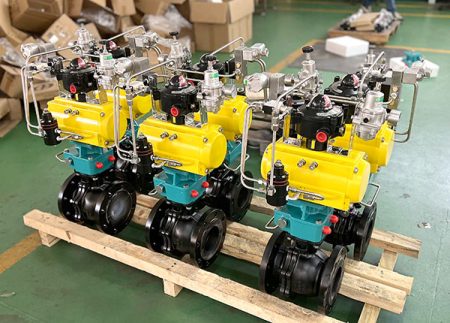
The valve connects to an air actuator. When air goes in, the actuator turns the ball. This lets fluid start or stop moving fast and safely.
Where can you use an air actuated ball valve?
Factories put these valves in pipes, chemical plants, and water systems. They are also used in food factories. These valves can handle water, steam, oil, and chemicals.
What are the main benefits of a pneumatic operated ball valve?
These valves react fast and shut off tightly. They last a long time, even in tough places. Using them means less work for people and safer systems.
How do you select the right actuating valve for your system?
Engineers look at what fluid will go through the valve. They check pressure, heat, and pipe size. They also make sure the materials and certificates are right. Picking the best valve and actuator keeps things safe and working well.
What maintenance does an air operated valve need?
You should check for leaks and clean the valve often. Change seals if they are worn out. Oil moving parts to help the valve last longer. Follow the maker’s plan to keep the valve working right.
Can you automate a ball valve with a pneumatic actuator valve?
Yes, you can. Adding a pneumatic actuator to a ball valve makes it automatic. This lets workers control the valve from far away and use it with plant machines.
What certifications should a pneumatic actuator valve have?
Look for ISO 9001, API 6D, and ATEX certificates. These show the valve is safe and good quality for factory use.
